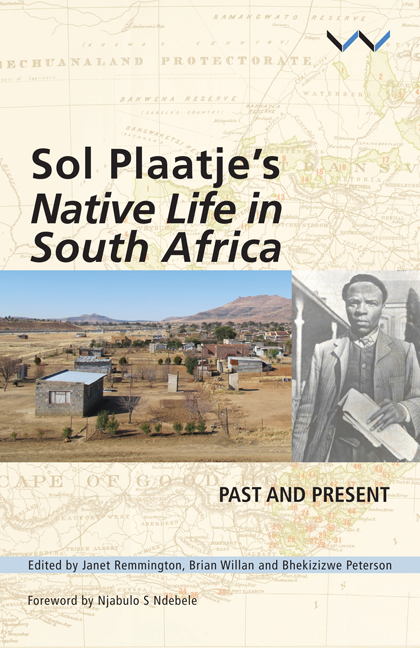Book contents
- Frontmatter
- Table of Contents
- Acknowledgements
- Foreword: Sol T Plaatje and the ‘power of all’
- Introduction: Native Life in South Africa – then and now
- Editions of Native Life in South Africa: 1916 to the present
- Looking Back: Foreword to Ravan Press edition of Native Life in South Africa, 1982
- Poetic Tributes
- A Contemporary Reimagining: The Road to Dikhudung
- Contributors
- Plaatje Resources
- List of Figures
- Index
Introduction: Native Life in South Africa – then and now
Published online by Cambridge University Press: 21 April 2018
- Frontmatter
- Table of Contents
- Acknowledgements
- Foreword: Sol T Plaatje and the ‘power of all’
- Introduction: Native Life in South Africa – then and now
- Editions of Native Life in South Africa: 1916 to the present
- Looking Back: Foreword to Ravan Press edition of Native Life in South Africa, 1982
- Poetic Tributes
- A Contemporary Reimagining: The Road to Dikhudung
- Contributors
- Plaatje Resources
- List of Figures
- Index
Summary
Sol Plaatje's Native Life in South Africa, originally published in 1916, was first and foremost a response to the landmark Natives’ Land Act of 1913. It arose out of the protest campaign of the South African Native National Congress (SANNC) founded in 1912, renamed in 1923 the African National Congress (ANC), Africa's oldest liberation movement and, since 1994, South Africa's ruling party.
But the book was far more than a robust rejoinder to a significant piece of legislation, and it was far from being an ANC publication. Native Life was Plaatje's distinctive handiwork, independent and individualistic, casting a wide net in its observations and sparing no one its critical gaze. It ranges widely in its commentary on pressing issues of the day – many persisting in contemporary South Africa – while vividly narrating the author's journeying in South Africa's farmlands and from its industrialising centres to Britain's imperial capital and beyond. Written by one of South Africa's most talented early twentieth-century black leaders and journalists, Native Life is a foundational, though sometimes under-recognised, book in South African politics, history and literature. At home and abroad, it is not nearly as widely studied or read as is Plaatje's 1930 novel Mhudi.
Native Life in South Africa, Before and Since the European War and the Boer Rebellion – to give it its full original title – looked like it might never see a printing press for all the odds that were stacked against it. Published in wartime London, but about South Africa and its place in the world, it would travel far and wide, inspiring support in some quarters and provoking censure in others. During the long, tumultuous twentieth century, it remained largely forgotten, yet re-emerged sporadically under different covers. It gained a measure of increased visibility in late apartheid through its positioning within the struggle genre under the radical Ravan imprint (see Bessie Head's Foreword to the edition reproduced in this volume), and through its publication as a Longman African Classic for British and world markets. A full listing of current and planned editions is provided in this volume for reference, and the opening chapter tells the extraordinary story of the writing, publication and reception of Native Life.
- Type
- Chapter
- Information
- Sol Plaatje's Native Life in South AfricaPast and Present, pp. xv - xxxivPublisher: Wits University PressPrint publication year: 2016

